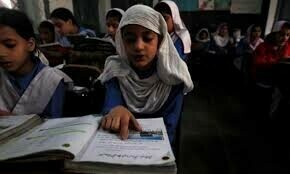ISLAMABAD: The steadily rising temperatures pose a serious risk to Pakistan’s efforts to achieve sustainable food security and meet the food consumption needs of its fast increasing population, said the Ministry of Climate Change, basing its arguments on various projections of climate change impacts on the country’s agriculture and water resources.
“Global warming induced by rising temperatures can badly affect Pakistan’s food production system in the shape of crop yield losses and reduced growing cycles in various climatic zones of the country,” said climate change ministry spokesperson Mohammad Saleem.
He said like most developing countries, Pakistan was staring at certain food insecurity with its food production out of sync with the population growth.
Food availability is further threatened by shifting weather patterns with recurring severe droughts and floods that affected the country’s overall crop production.
Climate change ministry says temperatures in Pakistan will increase at a faster pace than rest of the globe in coming decades
The spokesperson explained that studies carried out by the Global Change Impact Study Centre (GCISC), the ministry’s research wing, pointed to an average temperature increase over Pakistan in the coming decades at a pace faster than that of the average global temperature increase.
“The temperature rise in Pakistan may exceed by about one degree Celsius by the end of this century,” Mr Saleem cautioned, quoting the GCISC studies.
Based on crop simulation models of the GCISC, wheat crop yield would be reduced by 3.4pc to 12.5pc in semi-arid irrigated areas, including Faisalabad, Sheikhupura, and 3.8pc to 14.5pc in arid areas such as Hyderabad, Badin, Bahawalpur and Multan.
Around 16pc decline in overall wheat productivity in rain-dependent areas has been forecast in various areas of the Potohar region, including Chakwal district, under different climate change scenarios towards the end of the current century, the study said.
The official said graver impacts of global warming on the country’s rice crop had also been predicted.
“The rice crop yields are likely to register a fall by 12 to 22pc in almost all rice growing areas by the end of the century because of the rising global temperatures,” he said.
These simulation models further indicated that the length of cultivation periods of these important crops
would shorten which would lead to plunges in yields of not only rice and wheat but also other crops such as maize and vegetables.
The water requirements of different crops, including wheat and rice, could register a steep rise in coming decades on account of local impacts of global warming induced by rise in the global temperatures.
“The climate simulation models have revealed that net crop water requirements would sharply increase because of the global warming impacts on Pakistan’s already shrinking water resources. However, reduced water availability for these food crops in coming decades, which are vital to the country’s sustainable food security, may not help meet the rising water requirements of the various crops,” he said, adding: “As a result, the overall productivity of different food crops would decline as long as water conservation technologies, drought-resilient and high-yield crop varieties, rainwater harvesting programmes and direct seeding technologies were not deployed on war-footing.”
The country’s agriculture sector still remains mainstay of the national economy that accounts for 21pc share in the gross domestic production, contributed 40pc share in overall employment and 18pc in the overall exports.
“However, protecting country’s agriculture sector from fallouts of unfolding global warming-induced climate
change through an effective policy and science as well as technology-based adaptation and mitigation response is a key,” he added.
Published in Dawn, June 26th, 2017
















































Dear visitor, the comments section is undergoing an overhaul and will return soon.